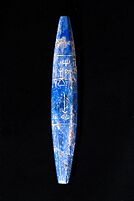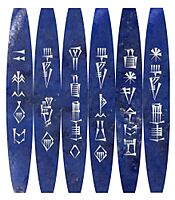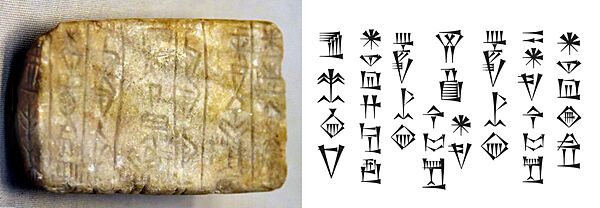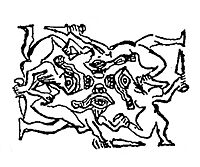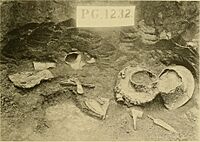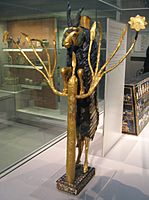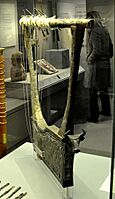Mesannepada facts for kids
Mesannepada (pronounced Meh-san-neh-PAH-dah) was a very important king in ancient Mesopotamia, a land now mostly in modern-day Iraq. He was the first king listed for the First Dynasty of Ur, a powerful kingdom around 2600 BC. The ancient Sumerian king list says he ruled for 80 years! He became king after defeating the city of Uruk. Some old seals found in the Royal Cemetery at Ur even call him the "King of Kish", which shows how powerful he was.
Quick facts for kids Mesannepada𒈩𒀭𒉌𒅆𒊒𒁕 |
|
|---|---|
| King of Kish, King of Ur | |
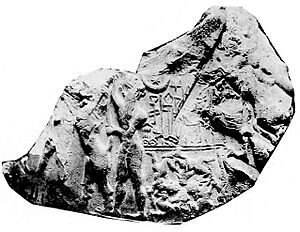 This is a picture of a cylinder seal from Mesannepada's time. It shows a king, a mythical bull, and lions. It also has writing that says "Mesannepada, king of Kish."
|
|
| Reign | fl. c. 2600 BC |
| Predecessor | Akalamdug |
| Successor | A'annepada |
| Spouse | Nintur |
| Issue | A'annepada Meskiagnun |
| House | First Dynasty of Ur |
| Father | Meskalamdug |
Contents
Family and Discoveries
Mesannepada was the son of another important ruler, Meskalamdug. We know this because of amazing discoveries made by archaeologists.
The Mari Bead
One special discovery was a lapis-lazuli bead found in a city called Mari. This bead had writing on it that said:
"To god Lugalkalam, Mesannepada, king of Ur, son of Meskalamdug, king of Kish, has consecrated this bead."
—Mesannepada Mari bead
This bead shows that Mesannepada was the son of Meskalamdug. It also tells us that Meskalamdug was once a "King of Kish." The bead was part of a collection of items called the "Treasure of Ur," found in Mari. This suggests that Ur and Mari had some kind of connection a long, long time ago.
A Son's Dedication
Mesannepada also had a son named A'annepada. We know about A'annepada from special stone tablets he made. These tablets say that A'annepada, "king of Ur, son of Mesannepada, king of Ur," built a temple for the goddess Ninhursag. This helps us understand the family tree of these ancient kings.
The Sumerian King List
The Sumerian King List is an ancient document that lists the kings of Sumer and how long they ruled. Mesannepada is the very first king mentioned for the First Dynasty of Ur. The list says:
"... Uruk with weapons was struck down, the kingship to Ur was carried off. In Ur Mesannepada was king, 80 years he ruled..."
—Sumerian King List, 137-147.
While 80 years is a very long time for a king to rule, especially back then, it shows how important he was considered. The list also names his son, Meskiagnun, as his successor.
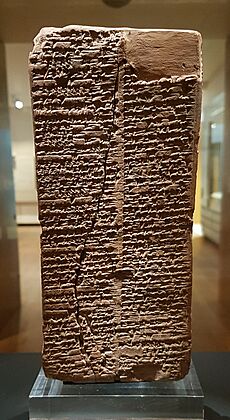
The Tummal Chronicle
Another ancient text, called the Tummal Inscription, also mentions Mesannepada. This tablet talks about kings who helped maintain a very important temple in the city of Nippur. It says that Mesannepada built a part of the temple for the god Enlil. His son, Meskiagnun, also helped keep the temple strong. This shows that Mesannepada was a powerful ruler who cared about important religious sites.
Mesannepada's Rule
Mesannepada's rule marked a time when the city of Ur became very powerful and influential. He expanded Ur's reach, not just through fighting, but also through diplomacy and trade.

The lapis-lazuli bead found in Mari, mentioned earlier, is a great example of this. It suggests that Ur had connections with distant cities like Mari. Many seals found in the Royal Cemetery at Ur also have the names of Mesannepada and his family members, like his wife, Queen Nintur, and his parents.
Mesannepada took the title "King of Kish". This was a very important title in ancient Sumer, showing that he was the most powerful ruler in the region. It meant he had control over many other cities.
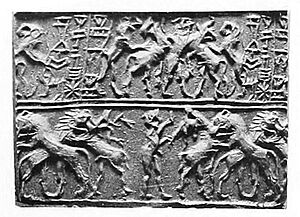
Mesannepada's son, Aannepadda, who built the temple for Ninhursag, is another sign of the family's power. This temple was located near a place called el-Obed.
The Royal Cemetery of Ur
Archaeologists believe that Mesannepada's tomb might be in the famous Royal Cemetery at Ur. This cemetery is known for its incredibly rich burials, including many valuable treasures and even evidence of human sacrifices.
Some experts think that tomb PG 1232 or PG 1237, which is sometimes called "the Great Death-Pit," could be his. These tombs contained amazing artifacts, showing the wealth and power of the rulers of Ur.
See also
 | Bayard Rustin |
 | Jeannette Carter |
 | Jeremiah A. Brown |


